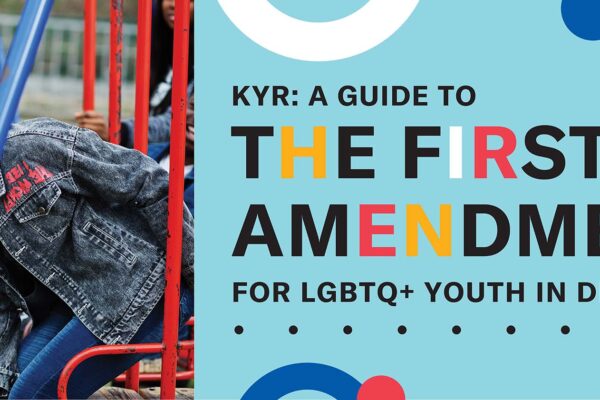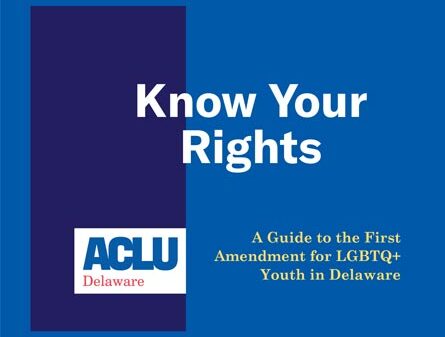Being part of the LGBTQ+ community as a kid can often be intimidating — and the policies that govern Delaware’s schools aren’t always designed to be inclusive of students who identify as part of these communities. That’s why we have launched a new resource: a “Know Your Rights” (KYR) handbook that aims to help students, parents, and educators learn their rights when it comes to LGBTQ+ expression in schools.
This online guide is also available as a print handbook. We encourage schools to make copies of this handbook available to their students and educators. Any school or community organization that wishes to have hard copies of the handbook can reach out to Melissa Bryson, ACLU-DE development director, to request copies at no charge: [email protected].
DID YOU KNOW...
That expressing your identity and ideas is like, super American? In fact, it’s one of the most important aspects of life in America. It’s so important that it’s protected by our Constitution in the Bill of Rights. In fact, it’s the very first thing mentioned in the Bill of Rights! That’s how important the Founders felt freedom of expression was to this nation, that they included protections in the very first amendment to the Constitution.
What is the First Amendment?
The First Amendment says exactly this: “Congress shall make no law respecting an establishment of religion, or prohibiting the free exercise thereof; or abridging the freedom of speech, or of the press; or the right of the people peaceably to assemble, and to petition the Government for a redress of grievances.”
If that sounds like a bunch of legal mumbo jumbo, don’t worry, the First Amendment’s been around a long time, and we’ve had a lot of time to figure out what that means.
It’s important for us to know that the First Amendment applies to everybody–including students! Because these rules are true for everybody and people can be so different from one another, there have been all sorts of challenges over the years where lawyers and judges and everyday people have tried to figure out how these rules apply. Many of these challenges have included LGBTQ+ people and their allies, and those challenges have led to legal protections. We’ll talk about what those rights and protections look like in the next section, but first, how about we go over a few definitions?
Browse the Guide Below
Know Your Rights: A Guide to the First Amendment for LGBTQ+ Youth in Delaware, is packed with information related to students’ rights around LGBTQ+ expression in schools. Click through the links below to read our full guide!
⬆️ A digestible outline of the First Amendment and how it applies to LGBTQ+ students’ expression in schools.
⬆️ Language and definitions that are commonly used in conversations about LGBTQ+ communities and issues.
LGBTQ+ Students: Know Your Rights!
⬆️ A full list of rights that LGBTQ+ people are promised in schools - regardless of individual school policies.
How Can You Make a Difference?
⬆️ A list of ways that students can use the First Amendment to express themselves in schools.
The School Board’s Role in Your Rights
⬆️ Information about the role that school boards play in policy-making for schools, and how students can make their voices heard even if they can’t vote.
⬆️ A list of resources for LGBTQ+ students in Delaware.
Stay Informed
Sign up to be the first to hear about how to take action.
By completing this form, I agree to receive occasional emails per the terms of the ACLU’s privacy statement.
By completing this form, I agree to receive occasional emails per the terms of the ACLU’s privacy statement.


